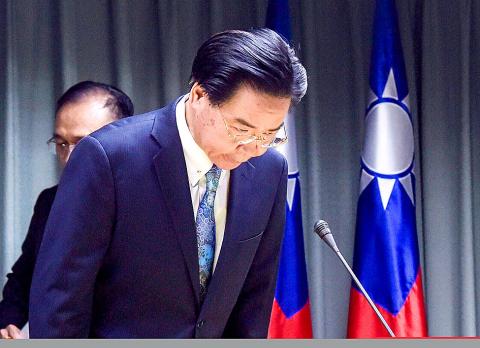Burkina Faso yesterday severed ties with Taiwan, the second diplomatic ally to do so within a month, prompting Minister of Foreign Affairs Joseph Wu (吳釗燮) to tender his resignation.
However, President Tsai Ing-wen (蔡英文) did not sign off on Wu’s resignation, Presidential Office spokesman Alex Huang (黃重諺) told the Taipei Times last night.
Speaking at an impromptu news conference in Taipei yesterday evening, Wu said that although Burkina Faso has yet to establish diplomatic ties with Beijing, it goes without saying that “China is the sole factor” in the African nation’s decision.

Photo: Huang Yao-cheng, Taipei Times
“This is the second nation in a month, after the Dominican Republic, to have made such a move. I share the public’s sadness, anger and regret over these incidents,” said Wu, who only took over the helm of the ministry in February.
China’s repeated attempts to poach Taiwan’s diplomatic allies and suppress its presence in the international arena would not narrow the gap across the Taiwan Strait — it would only further anger Taiwanese, Wu said.
“I would like to again quote President Tsai’s oft-stated pledge that we will never succumb to Beijing’s pressure,” Wu said, adding that China’s actions, both diplomatically and militarily, constitute a unilateral change of the cross-strait “status quo.”
The Ministry of Foreign Affairs first noticed warning signs regarding Burkina Faso prior to Tsai’s state visit to Africa last month, when Burkinabe President Roch Kabore prioritized an international gathering over meeting with Tsai, Wu said.
Media speculation in Burkina Faso regarding the establishment of diplomatic relations with Beijing were another sign, Wu said.
The ministry became more concerned after Burkina Faso became the nation’s only ally to not publicly speak up for Taiwan’s World Health Assembly (WHA) bid, Wu said.
A high-level government official previously said on condition of anonymity that China had written to all of Taiwan’s diplomatic allies warning them against speaking for Taiwan at this year’s WHA.
The Republic of China established diplomatic relations with Burkina Faso in 1961, but Ouagadougou switched recognition to the People’s Republic of China in 1973. Taiwan and Burkina Faso resumed ties in 1994.
Burkinabe Minister of Foreign Affairs Alpha Barry in February last year had told reporters that his nation had rejected a Beijing offer of US$50 billion and had no plans to switch allegiances.
Taiwan has lost three other diplomatic allies to China since Tsai’s inauguration: Sao Tome and Principe in December 2016, Panama in June last year and the Dominican Republic on April 30.
Regarding Taiwan’s relations with its sole remaining African ally, Eswatini, Wu said that he has “huge confidence” in the stability of their ties.
“President Tsai visited Eswatini just last month and she has maintained a good relationship with Swazi King Mswati III,” Wu said. “The king is also scheduled to visit Taiwan next month to attend his son’s graduation ceremony.”

The Central Election Commission has amended election and recall regulations to require elected office candidates to provide proof that they have no Chinese citizenship, a Cabinet report said. The commission on Oct. 29 last year revised the Measures for the Permission of Family-based Residence, Long-term Residence and Settlement of People from the Mainland Area in the Taiwan Area (大陸地區人民在台灣地區依親居留長期居留或定居許可辦法), the Executive Yuan said in a report it submitted to the legislature for review. The revision requires Chinese citizens applying for permanent residency to submit notarial documents showing that they have lost their Chinese household record and have renounced — or have never

A magnitude 5.6 earthquake struck off the coast of Yilan County at 12:37pm today, with clear shaking felt across much of northern Taiwan. There were no immediate reports of damage. The epicenter of the quake was 16.9km east-southeast of Yilan County Hall offshore at a depth of 66.8km, Central Weather Administration (CWA) data showed. The maximum intensity registered at a 4 in Yilan County’s Nanao Township (南澳) on Taiwan’s seven-tier scale. Other parts of Yilan, as well as certain areas of Hualien County, Taipei, New Taipei City, Taoyuan, Hsinchu County, Taichung and Miaoli County, recorded intensities of 3. Residents of Yilan County and Taipei received

Taiwan has secured another breakthrough in fruit exports, with jujubes, dragon fruit and lychees approved for shipment to the EU, the Ministry of Agriculture said yesterday. The Animal and Plant Health Inspection Agency on Thursday received formal notification of the approval from the EU, the ministry said, adding that the decision was expected to expand Taiwanese fruit producers’ access to high-end European markets. Taiwan exported 126 tonnes of lychees last year, valued at US$1.48 million, with Japan accounting for 102 tonnes. Other export destinations included New Zealand, Hong Kong, the US and Australia, ministry data showed. Jujube exports totaled 103 tonnes, valued at

BIG SPENDERS: Foreign investors bought the most Taiwan equities since 2005, signaling confidence that an AI boom would continue to benefit chipmakers Taiwan Semiconductor Manufacturing Co’s (TSMC, 台積電) market capitalization swelled to US$2 trillion for the first time following a 4.25 percent rally in its American depositary receipts (ADR) overnight, putting the world’s biggest contract chipmaker sixth on the list of the world’s biggest companies by market capitalization, just behind Amazon.com Inc. The site CompaniesMarketcap.com ranked TSMC ahead of Saudi Aramco and Meta Platforms Inc. The Taiwanese company’s ADRs on Tuesday surged to US$385.75 on the New York Stock Exchange, as strong demand for artificial intelligence (AI) applications led to chip supply constraints and boost revenue growth to record-breaking levels. Each TSMC ADR represents